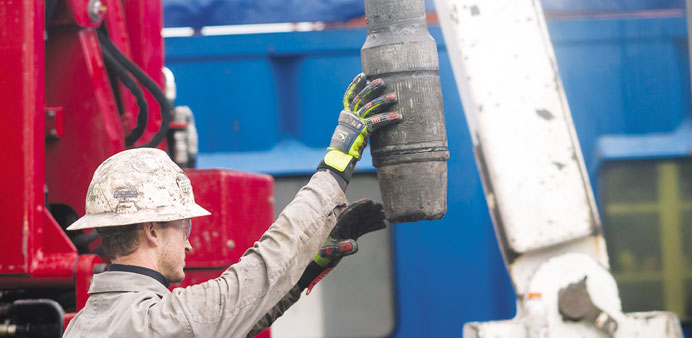A rig worker removes drill pipe from a natural gas well at a hydraulic fracturing site located atop the Marcellus shale rock formation in Washington Township, Pennsylvania. Britain’s £20bn ($32bn) chemicals business is losing sales to lower-cost competitors such as in the US, where new supplies from domestic shale drilling have reduced prices for natural gas, the fuel used in making chemicals such as plastics.
The US shale gas boom is reverberating across Britain’s chemical industry, the nation’s second-largest export earner.
The £20bn ($32bn) chemicals business is losing sales to lower-cost competitors such as in the US, where new supplies from domestic shale drilling have reduced prices for natural gas, the fuel used in making chemicals such as plastics. By 2020 the chemicals industry in the US will be 21% larger than in Europe, from near parity now, according to the American Chemistry Council.
The price of gas, also used to make electricity, in the past month averaged about two-thirds less in the US than in Britain, the steepest discount in five years. That’s giving Americans an edge over UK chemicals makers such as Ineos, the largest. BASF, India’s Tata Chemicals and Lotte Chemical Corp of South Korea have closed plants in Britain this year.
The UK chemicals industry has responded by joining the oil lobby in pushing the government to clear obstacles for drilling shale rock. The threat to chemicals, among the most energy-intensive industries, shows how the widening cost gap risks inflicting further pain on a UK industrial sector that’s yet to recover from the financial crisis.
“The chemical industry’s ability to underpin sustained growth in UK manufacturing is increasingly determined by the need for competitive and secure supplies of energy and feedstocks,” said Tom Crotty, a director at Ineos. “The safe exploitation of unconventional gas is central to that supply.”
Essar Energy, a unit of Mumbai-based Essar Group, is in talks with shale gas suppliers in the UK, the company has said. It uses gas to power processing plants and as feedstock for its Stanlow refinery and chemicals plants in the northwest.
The UK’s Chemical Industry Association, has warned the government that electricity costs are expected to rise by 70% by 2020, risking competitiveness, and has urged lawmakers to speed up the development of shale. The group wrote to Chancellor of the Exchequer George Osborne to “broaden and deepen” measures and to close the gap with US operators.
A study by the British Geological Survey found fields in northern England’s Bowland Basin may have enough shale gas to meet demand for almost 50 years.
While the UK government is encouraging shale drilling through lower taxes as reserves in the North Sea decline and imports rise, drilling has barely started, stymied by planning regulation and environmental pressure groups, which say exploration can contaminate water.
Tata will close a soda ash and calcium chloride plant, the company said on December 9. Lotte said on December 3 it will shut a purified terephthalic, or PTA, plant, while Germany’s BASF said in October it will close its Paisley pigments facility.
BASF, the world’s largest chemicals maker, said America’s shale boom will be a challenge for Europe.
“In the long term, this would result in a relocation of energy-intensive companies with a knock-on effect for the subsequent value chains,” CEO Kurt Bock said in October.
The US has seen $100bn of new investments in chemical manufacturing as costs are as low as in the Middle East, Steve Elliott, head of the UK’s CIA, said by phone on December 3.
Saudi Basic Industries Corp, also known as Sabic, is seeking a partner to form a chemicals venture in the US to benefit from low-cost shale gas supply, CEO Mohamed al-Mady said last month in Dubai.
Ineos’s Grangemouth site in Scotland faced closure this year, after months of losses, threatening more than 800 jobs before a deal was made with workers to save the plant.
The company, based in Rolle, Switzerland, will be importing ethane feedstock from the US and is building an import terminal to handle the increased flows. It will close a unit at the site by 2015 to be able to operate a newer plant at full capacity while expanding at its site in Norway.
The UK’s chemicals sector, grouped with pharmaceuticals, represents an eighth of all manufacturing and is the fourth largest after food, engineering and transport, according to the chemical industry.
Europe needs to catch up with the US and Asia in unconventional exploration, Sabic’s al-Mady said in a presentation in October.
“This is necessary to ensure that it can regain a cost leadership position to adequately serve its home market and support the entire advanced manufacturing supply chain in Europe,” he said.

